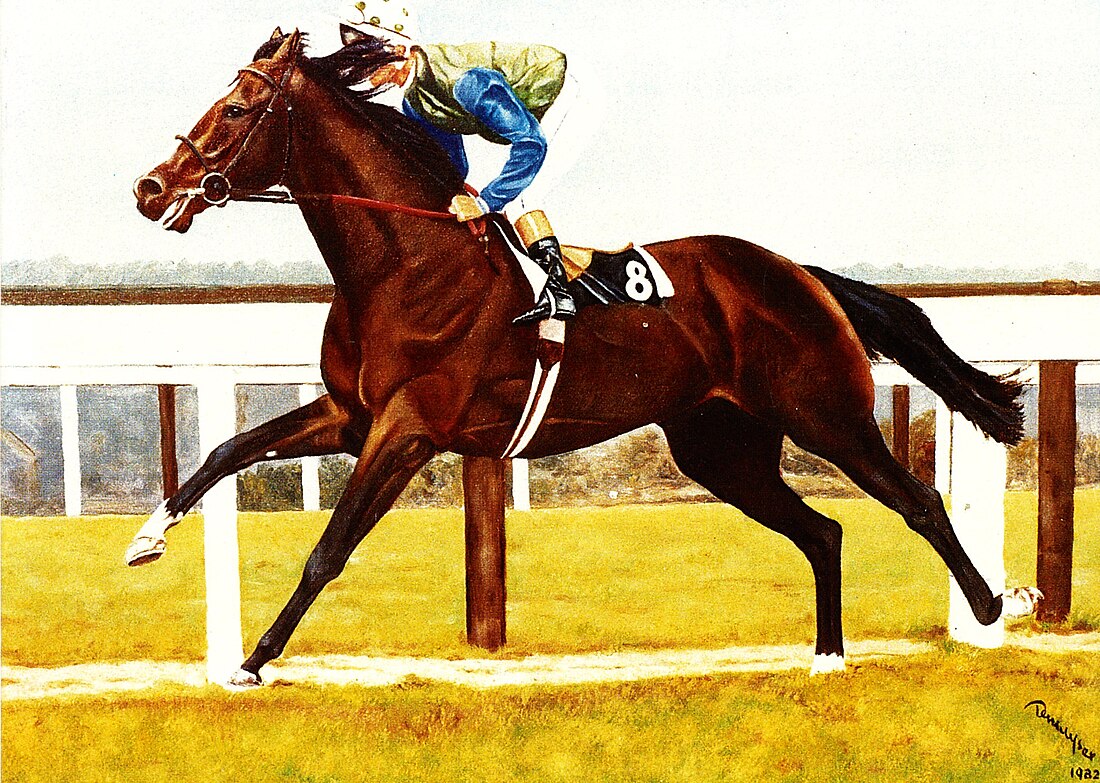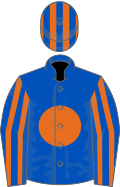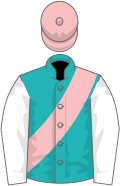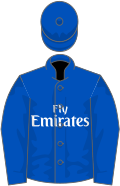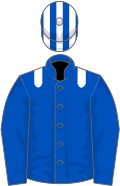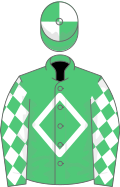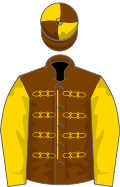Top Qs
Timeline
Chat
Perspective
Irish Derby
Horse race From Wikipedia, the free encyclopedia
Remove ads
The Irish Derby (Irish: Dearbaí na hÉireann) is a Group 1 flat horse race in Ireland open to three-year-old thoroughbred colts and fillies. It is run at the Curragh over a distance of 1 mile and 4 furlongs (2,414 metres), and it is scheduled to take place each year in late June or early July.
| 2025 | ||
 |
 |
 |
| Lambourn | Serious Contender | Lazy Griff |

It is Ireland's equivalent of the Derby Stakes, and it is usually held four weeks after the English race.
Remove ads
History
Summarize
Perspective
The earliest version of the Irish Derby was an event called the O'Darby Stakes. This was established in 1817, but it was discontinued after 1824. A subsequent race titled the Curragh Derby was inaugurated in 1848, but this was again short-lived.[citation needed]
The modern Irish Derby was created by the 3rd Earl of Howth, the 3rd Marquess of Drogheda and the 3rd Earl of Charlemont. It was first run in 1866, and it was initially contested over 1 mile, 6 furlongs and 3 yards. It was extended by 9 yards in 1869, and cut to its present distance in 1872. The first Epsom Derby winner to achieve victory in the Irish version was Orby, trained in Ireland by Fred McCabe, in 1907.[citation needed]
The Irish Derby became a major international race in 1962, when its prize money was substantially increased. Joe McGrath, a founder of the Irish Hospitals' Sweepstake, combined the race with the sweepstake, and it became known as the Irish Sweeps Derby. The event began to regularly attract the winners of the Epsom Derby, and Santa Claus became the second horse to win both races in 1964.[citation needed]
The Irish Derby was sponsored by Budweiser from 1986 to 2007, and it has been backed by Dubai Duty Free since 2008.[1] It is currently staged on the third day of the Curragh's three-day Irish Derby Festival meeting.[citation needed]
Twenty horses have now completed the English-Irish Derby double, and the most recent was Lambourn in 2025.[2]
Remove ads
Records
Summarize
Perspective
Leading jockey (6 wins):
- Morny Wing – Ballyheron (1921), Waygood (1923), Rock Star (1930), Rosewell (1938), Windsor Slipper (1942), Bright News (1946)
Leading trainer (17 wins):
- Aidan O'Brien – Desert King (1997), Galileo (2001), High Chaparral (2002), Dylan Thomas (2006), Soldier of Fortune (2007), Frozen Fire (2008), Fame and Glory (2009), Cape Blanco (2010), Treasure Beach (2011), Camelot (2012),[3] Australia (2014), Capri (2017), Sovereign (2019), Santiago (2020),Auguste Rodin (2023), Los Angeles (2024), Lambourn (2025)
Leading owner (17 wins): (includes part ownership)
- Michael Tabor – Desert King (1997), Montjeu (1999), Galileo (2001), High Chaparral (2002), Dylan Thomas (2006), Soldier of Fortune (2007), Frozen Fire (2008), Fame and Glory (2009), Cape Blanco (2010), Treasure Beach (2011), Australia (2014), Capri (2017), Sovereign (2019), Santiago (2020),Auguste Rodin (2023), Los Angeles (2024), Lambourn (2025)
A Unique Racing Record - Only Owner to complete the Derby and Grand National Double
- William Brophy, Herbertstown House, Two-Mile-House, Naas, County Kildare. Farmer, Breeder and Owner
In 1880 William Brophy completed a unique double by owning the winner of both the Irish Derby with King of the Bees and the Irish Grand National with Controller. Also uniquely both winners were out of the same Dam Winged Bee.
Remove ads
Winners since 1946
Summarize
Perspective
a Premonition finished first in 1953 but was disqualified.
Remove ads
Earlier winners
- 1866: Selim
- 1867: Golden Plover
- 1868: Madeira
- 1869: The Scout
- 1870: Billy Pitt
- 1871: Maid of Athens
- 1872: Trickstress
- 1873: Kyrle Daly
- 1874: Ben Battle
- 1875: Innishowen
- 1876: Umpire
- 1877: Redskin
- 1878: Madame du Barry
- 1879: Soulouque
- 1880: King of the Bees
- 1881: Master Ned
- 1882: Sortie
- 1883: Sylph
- 1884: Theologian
- 1885: St Kevin
- 1886: Theodemir
- 1887: Pet Fox
- 1888: Theodolite
- 1889: Tragedy
- 1890: Kentish Fire
- 1891: Narraghmore
- 1892: Roy Neil
- 1893: Bowline
- 1894: Blairfinde
- 1895: Portmarnock
- 1896: Gulsalberk
- 1897: Wales
- 1898: Noble Howard
- 1899: Oppressor
- 1900: Gallinaria
- 1901: Carrigavalla
- 1902: St Brendan
- 1903: Lord Rossmore
- 1904: Royal Arch
- 1905: Flax Park
- 1906: Killeagh
- 1907: Orby
- 1908: Wild Bouquet
- 1909: Bachelor's Double
- 1910: Aviator
- 1911: Shanballymore
- 1912: Civility
- 1913: Bachelor's Wedding
- 1914: Land of Song
- 1915: Ballaghtobin
- 1916: Furore
- 1917: First Flier
- 1918: King John
- 1919: Loch Lomond
- 1920: He Goes
- 1921: Ballyheron
- 1922: Spike Island
- 1923: Waygood
- 1924: Haine / Zodiac 1
- 1925: Zionist
- 1926: Embargo
- 1927: Knight of the Grail
- 1928: Baytown
- 1929: Kopi
- 1930: Rock Star
- 1931: Sea Serpent
- 1932: Dastur
- 1933: Harinero
- 1934: Patriot King / Primero[a]
- 1935: Museum
- 1936: Raeburn
- 1937: Phideas
- 1938: Rosewell
- 1939: Mondragon
- 1940: Turkhan
- 1941: Sol Oriens
- 1942: Windsor Slipper
- 1943: The Phoenix
- 1944: Slide On
- 1945: Piccadilly
- The 1924 and 1934 races were dead-heats and have joint winners.
Remove ads
See also
References
External links
Wikiwand - on
Seamless Wikipedia browsing. On steroids.
Remove ads
